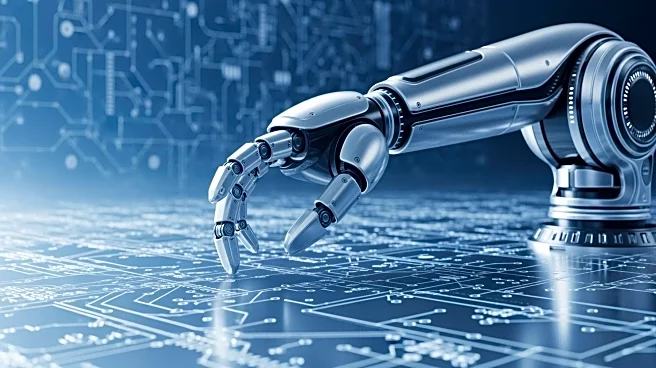What's Happening?
The robotics industry, particularly in the sectors of autonomous mobile robots (AMRs) and collaborative robotic arms (cobots), is experiencing significant market saturation. Companies like Universal Robots
and Geek+ have been pivotal in transforming niche technologies into mainstream solutions. However, the rapid growth has attracted numerous competitors, leading to increased market saturation and price pressures. Universal Robots reported a modest revenue increase to $293 million in 2024, while Geek+ announced a half-year revenue of RMB 1.025 billion for 2025, both indicating a slowdown in growth compared to previous years. The market is now characterized by thinner margins and heightened competition, with many companies offering similar features and fighting for the same customer base.
Why It's Important?
The saturation of the robotics market has significant implications for the industry and its stakeholders. As competition intensifies, companies are forced to adopt strategic measures to maintain profitability and market share. This includes shifting towards servitization, where products are offered as ongoing services, and focusing on niche specializations to differentiate from competitors. The current market dynamics highlight the challenges of sustaining growth in a mature industry and underscore the importance of strategic positioning and innovation. Companies that successfully adapt to these conditions can maintain profitability and potentially gain a competitive edge, while those that fail to do so may struggle to survive.
What's Next?
As the market continues to mature, companies are likely to focus on optimizing their business models to enhance customer value and retention. Strategies such as servitization, differentiation, and leveraging experience curves will be crucial for survival. The industry may also see increased consolidation as companies seek to strengthen their market positions through mergers and acquisitions. Additionally, the focus on software and data-driven solutions is expected to grow, as companies aim to enhance the performance and integration of their robotic systems. The ability to adapt to these changes will determine the long-term success of companies in the robotics sector.
Beyond the Headlines
The saturation of the robotics market also raises ethical and cultural considerations, particularly regarding the impact of automation on employment and workforce dynamics. As companies focus on efficiency and cost reduction, there may be broader societal implications, including job displacement and the need for workforce reskilling. Additionally, the emphasis on data-driven solutions highlights the importance of data privacy and security in the industry. Companies must navigate these challenges while balancing innovation with ethical considerations to ensure sustainable growth and positive societal impact.










